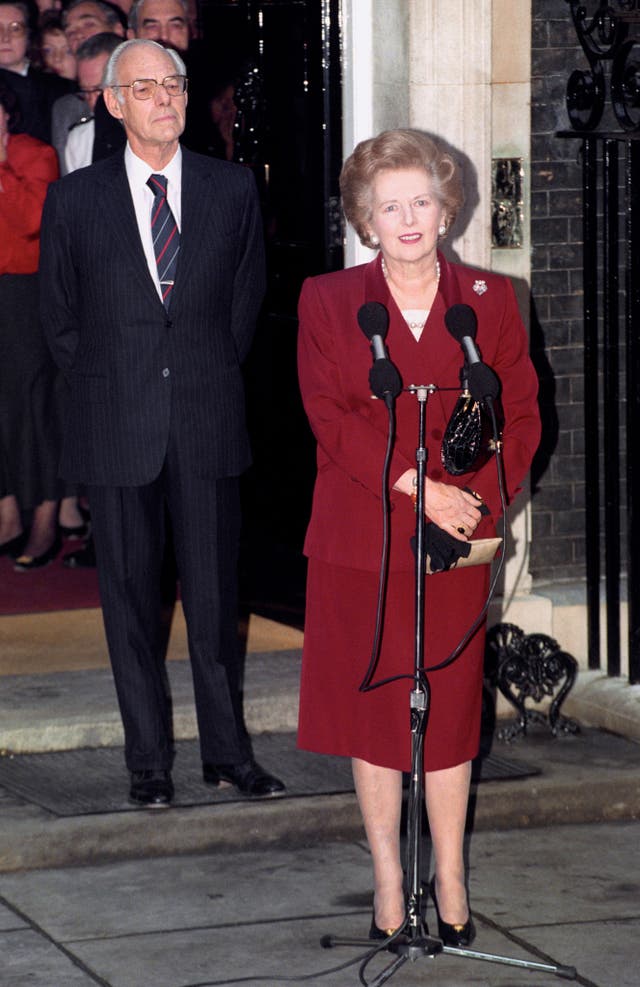May latest Tory PM to be toppled over Europe
Theresa May said it was a matter of ‘deep regret’ she had not been able to deliver Brexit.

It all ended in tears as Theresa May became the latest Tory premier who failed to manage the party’s divisions over Europe.
The Prime Minister’s emotional speech announcing her decision to quit means she becomes the fourth Conservative prime minister in a row to have suffered over the relationship with Europe.
– Margaret Thatcher
After more than 11 years in office, Mrs Thatcher was forced out of Number 10 in November 1990.
Although other issues, including the hugely divisive poll tax, played a part in her downfall, ultimately it was divisions over Europe which forced her out of office.
Geoffrey Howe’s resignation speech after quitting as deputy prime minister over Europe paved the way for Mrs Thatcher’s own departure within weeks.
In a scathing statement, he told MPs “the prime minister’s perceived attitude towards Europe is running increasingly serious risks for the future of our nation” and he argued that her Eurosceptic approach was damaging efforts to cooperate with the European Economic Community.
“It is rather like sending your opening batsmen to the crease only for them to find, the moment the first balls are bowled, that their bats have been broken before the game by the team captain,” he said.
Like Mrs May, she shed a tear as she left office following a revolt by her own ministers.

– John Major
Sir John faced huge problems with the Eurosceptic wing of the Tory Party, including three Cabinet ministers he called “bastards” in comments picked up by a TV microphone.

The rows over the Maastricht Treaty were every inch as bitter as the current Tory difficulties over Brexit.
Sir John’s running battles with the Eurosceptics led him to issue a “put up or shut up” challenge, resigning as Tory leader to force a contest in 1995 in which he comfortably defeated John Redwood.
But his authority was in tatters after years of internal Conservative warfare and by the time the 1997 election came along, voters delivered a Labour landslide.
– David Cameron
The rise of Ukip and mounting pressure from Eurosceptics led Mr Cameron to promise a referendum on the UK’s membership of the EU.
The divisions in his cabinet saw senior ministers, including close friend Michael Gove, campaign for Brexit as Mr Cameron fought on the Remain side.
The historic 2016 vote saw a 52% to 48% victory for the Leave cause, which put the UK on a course out of the European Union and Mr Cameron out of office.
Just hours after the result was clear, Mr Cameron stood in Downing Street and said: “I do not think it would be right for me to try to be the captain that steers our country to its next destination.”
– Theresa May
A Cabinet mutiny over her final attempt to get a Brexit deal through and the prospect of another backbench bid to oust her meant the Prime Minister was forced to set the date for her departure.
Mrs May said she had done “everything I can” to persuade MPs to back her Brexit deal, but in the end it was nowhere near enough.
“It is and will always remain a matter of deep regret to me that I have not been able to deliver Brexit,” she said in her tearful resignation statement.
– The next Tory leader?
Whoever replaces the Prime Minister will still have the task of getting the UK out of the EU, with the same challenging parliamentary arithmetic that prevented her from succeeding.
In a message apparently aimed at hardline Brexiteers such as Boris Johnson or Dominic Raab, Mrs May said her successor must find a consensus in Parliament for their approach.
“Such a consensus can only be reached if those on all sides of the debate are willing to compromise,” she added.
The European Union indicated it remained unwilling to consider reopening the legal text of the Withdrawal Agreement thrashed out by Mrs May over months of negotiations.





